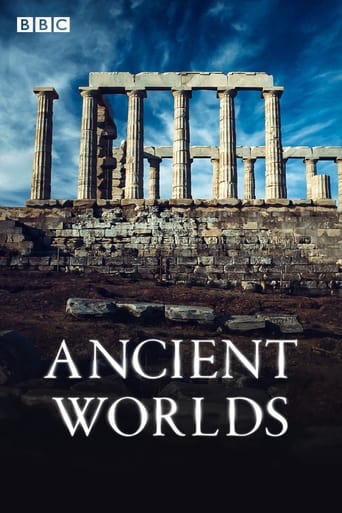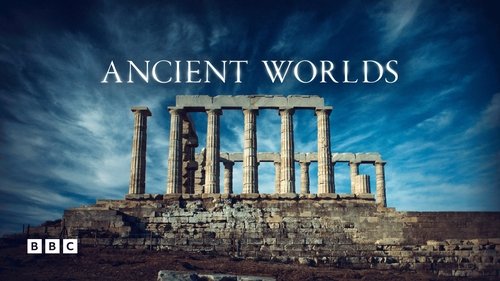Robert J. Maxwell
The narrator, Richard Miles, has the face of an actor but he wouldn't play the good guy. He'd be the snide villain. However, he sounds like a well-intentioned chap who is trying to entertain and enlighten us at the same time. Yes, modern perspectives are thrust into the narrative. He tells us at the outset that his purpose is "to find us - in them." I can see where his often opinionated approach might offend historians used to distanced judgments. I haven't finished watching the series but I rather enjoyed his rambling through the centuries so far. The location photography is evocative and Miles tries to throw in a bit of humor from time to time. It's refreshing to hear an ancient letter read from a wife to her traveling salesman husband, complaining that he hasn't brought home enough shekels or whatever to make it possible for her to paint the house or -- better yet -- to build a home as big as those damned neighbors'. Miles comments: "Madam, four thousand years on, you still know how to make a man feel bad." I suppose these kinds of asides can be called sexist but I laughed out loud, partly because Miles tries so hard to make the letter amusing -- and fails. The letter is funny and Miles' remark is funny, but he's not. Some fellows can tell a joke and some can't.He caught me off guard once or twice. I'm not a historian but a long time ago I had classes in archeology and I didn't know that Uruk was the first city. I'd learned it was Jericho. He deals with some of the big names like Leonard Wooley ("Ur of the Chaldees") but I'd never realized that Agatha Christie's archaeologist husband did some serious work in what was then Mesopotamia. The name of Abu Simbel was familiar but I never knew it was the site of a big battle between Egypt and another empire. I'll have to read or watch "Death on the Nile" again.For what it's worth, Miles paints Egypt as a pretty dull place, a preserve that neither influenced any other culture nor was influenced by any. I suppose Leo Frobenius would disagree but I don't know. I enjoy those mammoth figures on their seats. The rest of it -- the pyramids and the sphinx -- is exotic and colorful. He mentions the incestuous pharaonic rulers in one sentence, only to dismiss them. He could have livened up the presentation by noting that, however boring, however obsessed with death, Egypt lasted about two millenia. That was a really long time for a "civilization." Ancient Greece flourished for about six hundred years, and, after all, Cleopatra came at the end but was charming enough to seduce two important Romans -- Julius Caesar when she was a teen, and Brutus when she was turning matronly. That's twelve generations of incest talking for you.What kept occurring to me, throughout this first episode, is that it was pretty airy and uncoordinated. Miles' leaps through time and space left me wondering which century I was in and who it was that once lived in these geometrical ruins.At the same time, I wondered about most of the students I've had, to whom all of these names and places are a vast lacuna on the wall of history. Anything -- however imperfect -- that would help them grasp the nature of our cultural origins would be an improvement.
adriaticHR
I felt compelled to write a review after reading the other two on this site.So, to begin, the series tackles the mammoth task of explaining, briefly, the history of human civilization from the rise of cities in Mesopotamia through the dissolution of the Roman Empire. As such, generalizations are mandatory, and there is nothing strange about them, because every historical synthesis has to resort to them, which renders the other two reviews on this site useless.The most fascinating aspect of the series is the amount of individual footage, it is just amazing. Unlike most documentaries, who tend to dwell on one particular piece of footage in order to cut the costs, this one fits as much of different things from different countries as possible.All in all, this is a great series for those interested in the ancient history, it works as a sort of illustrated history of the ancient world that is both useful for the general public and the experts alike.
M34
I went into this series with high hopes. So much work is being done especially in fresh views on ancient and classical near eastern and historiography But this series is a big let down for anyone with a decent background in history. It is chock full of generalizations, patronizing views, projecting of modern morality, and frankly biases. It is an impressionistic set of distortions.The ancient Assyrians are essentially painted as a massive rapacious war machine when the evidence of Assyrian art and culture, and relative behavior of other empires or expanding states, are left out of the equation.The ancient Greeks get a real drubbing, in an episode that is absurdity piled on absurdity to the point of near hate speech. The presenter, Miles, treatment of Solon is snarky, not based on fact, and simply idiotic.The reliance on biblical texts, which we now rightly see as highly prejudicial to Judea's competitors, is strange in modern historiography. Miles goes on about supposed child sacrifice by Phoenicians and Ba'al worshipers when most historians now see that as propaganda and the supposed sites are now seen as likely simply child burial grounds.I would stick with Woods work or another new BBC series "BBC Bible's Buried Secrets" for more sober, less judgmental and more factual documentary treatment of ancient hisotry of the region.
templar_71
Incredibly poor I'm afraid. In the effort to popularize these big topics the programmes are as misleading as fiction. Describing Ptolemy as Alexander's "boyhood friend and food taster" and "Mr Fix-it" is incredibly glib and merely pulls out a couple of facts to present a character portrait. Alexander's burning of Persepolis is "an act of contempt" - one interpretation, other theories as to what happened and why are not even mentioned.Likewise treatment of 500 years of Roman history and the rise of Christianity means that matters are taken out of order, events described in misleading simplicity.There are sometimes interesting snippets, but the programs took on far too much and makes sweeping generalizations based on modern perceptions. Very disappointing.



